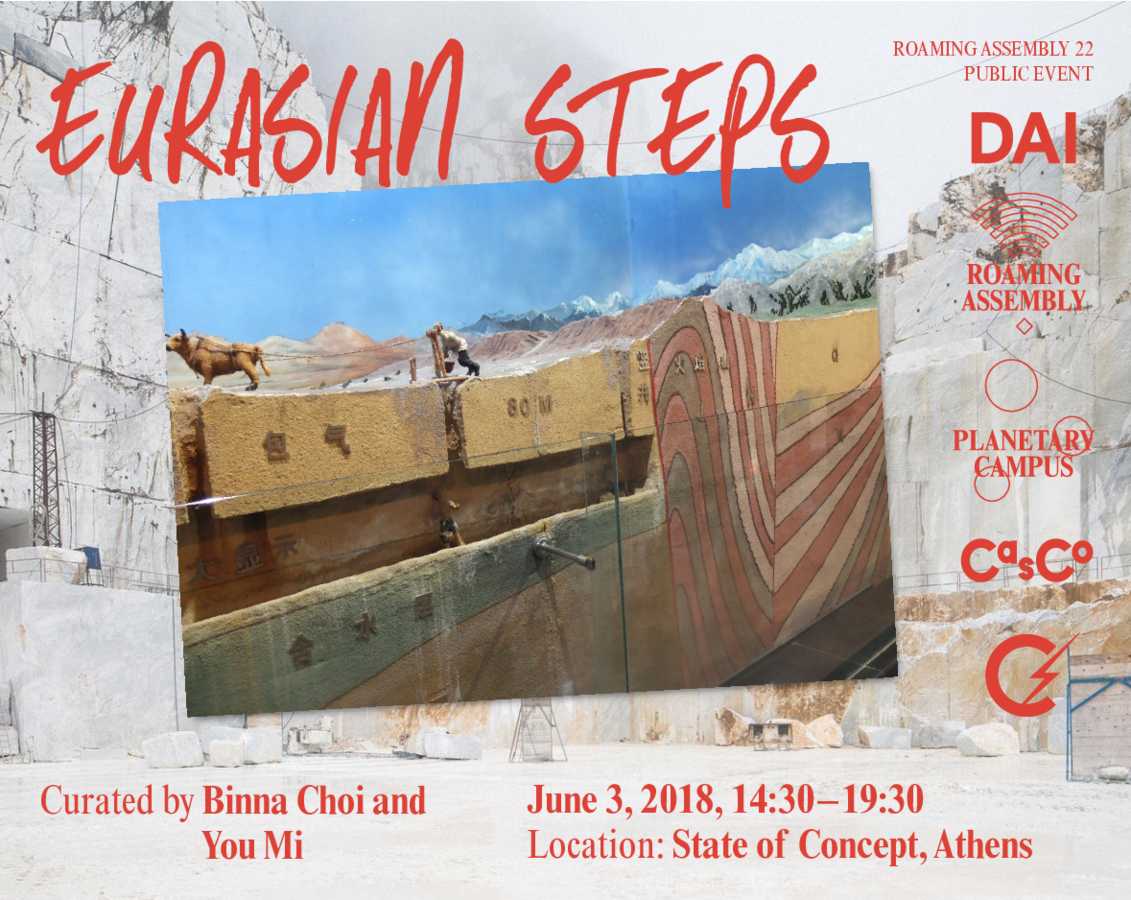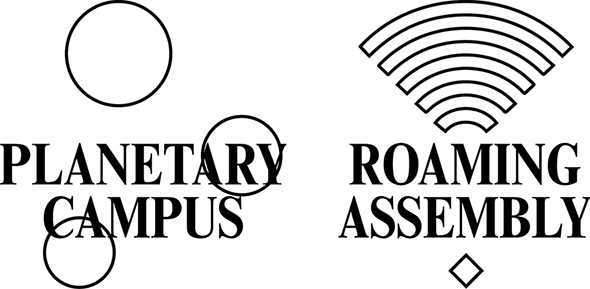2018 ~ Sunday June 3 in Athens: Roaming Assembly#22 ~ Eurasian Steps ~ Curators: You Mi and Binna Choi
Sunday June 3 in Athens: DAI Planetary Campus and State of Concept warmly invite you to
ROAMING ASSEMBLY #22 ~ EURASIAN STEPS
which will be the first itinerant movement of Unmapping Eurasia, a long-term trans-cultural project initiated at Casco Art Institute: Working for the Commons.
Eurasian Steps in Athens focuses on (de-)constructing the city as a “Eurasian gateway”, from where the Hellenistic culture was spread from Europe to middle Eurasia, as well as serving as a node point for transcultural dialogues in various periods in history.
Curators: Binna Choi and You Mi
With:
Pegy Zali (KERNEL)
Xenia Kalpaktsoglou (The Laboratory for the Urban Commons)
and the DAI Planetary Campus Factory participants
Program
14:30 Welcome by iLiana Fokianaki (State of Concept) and Gabriëlle Schleijpen (DAI)
14:40 Binna Choi: Eurasian Commons [see video documentation]
15:10 Barcelona rift with the DAI Planetary Campus Factory participants
15:20 You Mi: Silk Roads, Tributary Networks and Old and New Imperialism [see video documentation]
16:00 Barcelona rift with the DAI Planetary Campus Factory participants16.10 break16:20 Nikolay Smirnov: Left wing Eurasianism: returning of the Universalism “Living in the name of the Commons” [see video documentation]17:00 Barcelona rift with the DAI factory workshop participants17:10 Pegy Zali in conversation with Xenia Kalpaktsoglou [see video documentation]18:00 Barcelona rift with the DAI Planetary Campus Factory workshop participants18.10 break18:20 Sung Hwan Kim with a screening of Summer Days in Keijo – written in 1937 (2007, 17 min)19:00 Barcelona rift with the DAI Planetary Campus Factory workshop participants19:10 Unmapping Eurasia (Pathways drawing)19:30 Drinks
Introduction
Eurasia, in its most simplistic term, is a landmass that embraces a vast space between a western end of Europe and an eastern end of Asia. Taking this notion of Eurasia beyond the tropes of West and East, however, promises an exploratory, open-ended journey into one of the most complex thinkings which questions existing borders and distinctions in all dimensions such as the geographical, cultural, political, and social ones– and in turn calls for new connections and pathways including the cosmic, geologic and spiritual dimensions.
Eurasian Steps in Athens focuses on (de-)constructing the city as a “Eurasian gateway”, from where the Hellenistic culture was spread from Europe to middle Eurasia, as well as serving as a node point for transcultural dialogues in various periods in history. Binna Choi and You Mi, two initiators of Unmapping Eurasia, along with Russian artist/curator Nikolay Smirnov will map out aesthetic, cultural, political, and economic Eurasian projects in the past and present, and then unpack their ambitions, pitfalls, and legacies – from Russia’s right-wing Eurasianism to the lesser known left-wing Eurasianism, from imperial Chinese tributary system and decentralised trade networks to China’s Belt and Road Initiative. The contrapuntal narratives will be provided by Pegy Zali (from Athens-based collective Kernel) in conversation with Athens based curator Xenia Kalpaktsoglou, both founding members of The Laboratory for the Urban Commons which, through its research and artistic projects, probes at the material strata of the current infrastructure and logistical projects. This will resonate with the presentation by New York-based Korean artist Sung Hwan Kim who conjures perspectives on labor, movement and landscape in his current research into the rarely traced history of migration in Asian minor in the United States, that offers itself an allegorical potential for Eurasia, if not challenging its boundary. Ultimately, the Roaming Assembly iteration of Eurasian Steps, with artists, researchers and Dutch Art Institute participants stages an image of a “slower Silk Road” envisioned by the French anarchist geographer Élisée Reclus. They will perform variations, disruptions and contingencies around the narrative of shared histories in Europe and Asia. And with that, an acute sense of ethics or heightened consciousness comes to the fore – resonating the thinking of Reclus: how can the humanity’s collective self-awareness form one body with the planet itself?
Practical information
Roaming Assembly #22: EURASIAN STEPS
Date: June 3, 2018
Time: 14.30 - 19.30h
Free entrance, join our fb event.
Followed by a communal dinner by Options Foodlab to which you are warmly invited. If you wish to join, please send an email to Nikos Doulos (N.Doulos@artez.nl) on June 1st. Costs are 10 euro (dinner and a glass of wine) which can be paid in cash and on sight to Nikos.
Location: State of Concept, Mpotsari Tousa 19, Athina 117 41, Greece.
(Between May 11 and July 2, 2018 DAI Roaming Academy and 'State of Concept' will merge programs. Beginning with the exhibition A Case Of Perpetual No of artist and DAI alumna Yota Ioannidou, a co-production. On the two days prior to Roaming Assembly#22 you are welcome to join us for COOP SUMMIT 2018, where seven study groups will meet the public at various locations in Athens.June 29, 30 and July 1 DAI presents 24 Graduation Acts at State of Concept.)
About Unmapping Eurasia
Unmapping Eurasia is a long-term trans-cultural project initiated at Casco Art Institute: Working for the Commons that approaches Eurasia as a broad yet non abstract field for commoning practice and take an itinerant approach by evolving in several itinerant movements along with other institutional and non-institutional partners on board to be co-initiators, researchers, and cartographers. Each movement involves several stopovers where encounters, studies, discoveries, speculation and imagination over other kinds of movements, institutions, infrastructures, resources, and culture take place in collective forms, becoming pathways that lead to and materialize as artworks, maps and/or texts.
Eurasian Steps is the first itinerant movement of Unmapping Eurasia, that takes a journey from Amsterdam via Athens to Seoul. While the name recalls the Great Steppe of Central Asia, known as the heart of Eurasia, it tries to deconstruct any centralism and assemble different narratives and methods in approaching Eurasia – hence the modest, initial step towards (un-)making Eurasia as a collective body.
Eurasian Steps continues in Seoul on 30 June in a form of “walking exhibition”, departing from the Nam June Paik Memorial House in Seoul. The first movement - Amsterdam - Athens - Seoul - unfolds with support of the Dutch Art Institute's Planetary Campus, the Dutch Embassy in Seoul for its NEDxPO 2018 program, and Media City Seoul / Seoul Museum of Art.
About
Planetary Campus is an innovative conceptual space (without walls) where the MA curriculum "DAI Art Praxis" meets with a wide variety of external parties. A welcoming space where we want to host a fleeting, "affective community", where we generously share art and research, where complexity can be embraced and intellectual intra-actions are fostered, aiming to endow our praxes, wherever they are operational. As an infrastructure Planetary Campus is the container for several activities initiated by the DAI.
One of them is the Roaming Assembly, a recurring public symposium scheduled to take place once a month, functioning as it were as the DAI-week's 'centerfold' event. This state-of-the-art speculative and hybrid program explores specific themes and topics of contemporary relevance to the thinking of art in the world today.
Although closely interlinked with the DAI's curriculum, Roaming Assembly editions are not conceived as plain extensions of the regular DAI classes and seminars, but rather envisioned as sovereign happenings, designed to mobilize our bodies, our intelligences.
Initiator and curator-in-chief Planetary Campus: Gabriëlle Schleijpen
Senior coordinator Planetary Campus: Nikos Doulos
Documentation: Silvia Ulloa; see our Video Archive
Communication design: Lauren Alexander/Foundland
If you want to receive our DAI-BULLETIN on a monthly base you are welcome to register here.
DAI 's Planetary Campus is generously supported by the Innovations Fund of the



